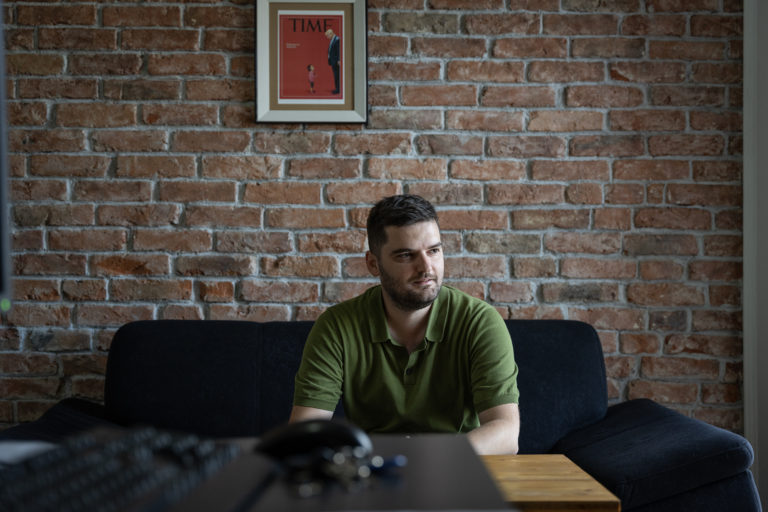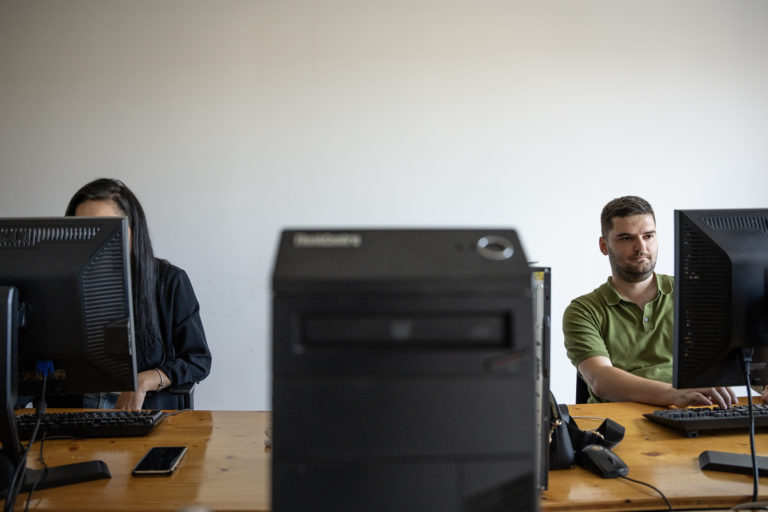Article 2 of the series: Surviving Kosovo’s Crowded Media Landscape
Author: Gentiana Paçarizi
Punctuated by its recent history of war and independence, and also the worldwide context post Covid-19, Kosovo’s ‘young’ media landscape is characterised by significant rivalry and limited funding opportunities. Within the global need for media renewal and a constrained Kosovo’s advertising market, the challenge of independence is a tough business, but highlights the resilience of its media outlets.

Mentor Gjergjaj, Reporteri – © Majlinda Hoxha / K2.0
Financial constraints drive online media towards donor funding
In 2019, three Kosovar journalists decided to establish the online news portal Reporteri.net. The fourth shareholder was a friend of theirs who had several small businesses and who agreed to cover the initial expenses of the new venture. This included a few months of salary and equipment such as computers, tables, chairs, a camera, and two microphones.
Co-founder and now editor-in-chief of Reporteri, Mentor Gjergjaj, said that they started this media outlet to change things up in local online journalism. At that time, many online media outlets were being established but they did not bring diversity in content or better journalistic coverage.
"Everyone wants to create The Guardian of Kosovo, but financial constraints and limited capacity make this goal a challenge," said Gjergjaj. "Most media outlets, especially those founded by journalists, find that they offer their professional capacity, but don't have other opportunities. They don't generate much income and they don't have the capacity to approach other journalists to join them."
The number of online media outlets clearly outnumbers other forms of media in Kosovo. Over 50 online media outlets are members of the Press Council of Kosovo (PCK), the self-regulated journalists' organisation. Dozens of other online media outlets also operate who are not part of the PCK.
The challenge of securing independence
According to Gjergjaj, it is a challenge to start a media outlet independent of the type of financial support powerful business and politics can provide.
"We started Reporteri as a way to break the uniformity of content that is determined by clickability," said Gjergjaj. "Even today, we try to create content based on relevance and not clicks."
Gjergjaj said that together with the outlet's executive director, Bekim Kabashi, they managed to attract some businesses to advertise with them due to their professional backgrounds. Both Gjergjaj and Kabashi were known for their journalistic work at other outlets.
"When we started Reporteri, businesses and other clients believed that we could create a good media outlet, so they supported us with a small advertisement or with around 200-300 euros per month" said Gjergjaj. "In the beginning, when you don't have a big income, even that is enough."
Today, Reporteri's editorial office consists of ten journalists working in three rooms in the center of Prishtina. The monthly expenses are around 7,000 to 8,000 euros, the majority of which is covered by advertising.
According to data sent to K2.0, Reporteri gets monthly traffic of around 1.5 million sessions from about half a million unique users, totalling 2.3 million page views. Reporteri receives approximately 60,000 daily readers with the vast majority of its audience coming from Facebook.
Although Gjergjaj said that they have integrated into the media market, they have not managed to solve all their problems relating to the advertising sector.
"After the Covid-19 pandemic and the financial crisis of 2022, business advertising took a turn for the worse," said Gjergjaj. "If you are a media outlet that wants to maintain editorial independence and professionalism, businesses are often unwilling to partner with you. Most of them do not think that financially supporting a media outlet that does not have much income, despite its professionalism and vision, will contribute to media freedom."
According to him, due to the possibility of advertising on social networks, businesses only advertise in the media when they think that it might benefit their business interests or they have other interests in media outlets.

Mentor Gjergjaj, Reporteri – © Majlinda Hoxha / K2.0
Click-based revenue
Another source of income for online media is the revenue generated from clicks. Media outlets partner with different programs that compensate them based on the number of clicks on pages where ads are displayed.
According to Gjergjaj, this has led to the trend of clickbait articles, where the headline does not reflect the article’s content, as well as the spread of fake news.
In their best months, Reporteri can earn 3,000 euros from revenue generated from clicks.
Another source of income on social networks is payment for video views, which can be significant if the videos go viral. This trend has driven online media content creators to focus on producing short videos that can be used on multiple social media platforms. These opportunities for financial gain have often led to the violation of professional standards.
The introduction of new media formats creates new problems, particularly in terms of content monitoring. In Kosovo, written online media content mainly falls under the domain of the PCK, while audiovisual broadcast content falls under the domain of the Independent Media Commission (IMC), which regulates broadcasters in Kosovo. However, the audiovisual content of online media outlets is not monitored.
Financial instability has stopped Reporteri from realising their initial goals. Being unable to get more staff to do field work and conduct investigations means that their work is less up to date than Gjergjaj would like.
"When you have more financial means, you can create a team that only deals with investigative journalism," said Gjergjaj. "There is a lack of comprehensive journalistic reporting that provides coverage of developments. The need for clicks makes it necessary to report a development in five different short articles, so the reader has to read five articles to understand the event and its context."
The need to be constantly publishing on websites and social networks has created a culture of copy-paste. When media outlets are in need of content, they steal each other's content. This often happens without citing the source and in violation of the Press Council's Code of Ethics on Copyright, which forbids plagiarism and the publication of full articles or published material without prior permission or proper attribution.
The pressure to publish constantly is hard on the journalists who sometimes have to publish content every 5 to 10 minutes in order to juice the social media algorithms and increase engagement.
Like many online media outlets that operate under financial constraints, Reporteri does not employ an editor on the night shift, despite the fact that their website and social media page are updated until midnight.
Pursuing international funding
Given the direction that the advertising sector is taking and the general pessimism about achieving financial sustainability, Gjergjaj has turned to seeking funding from projects supported by international donors. Reporteri recently won their first development project funding from the U.S. Embassy in Kosovo. Gjergjaj believes that this will elevate the outlet to a completely different professional level.
"I think that the way we have preserved our independence for four years, by preserving our principles and ethics, has hurt us a lot financially," said Gjergjaj. "Now through grants, we feel more stable, as they are provided to raise the professionalism and capacities of media outlets. In return, you have an obligation to reach that goal. Grants make you independent."
Until recently, project funding calls in the media sector have primarily targeted media outlets registered as NGOs. In addition to developing newsroom journalism, project funding has supported other media-related projects. This has led to the creation of more financially sustainable media outlets, such as Kosovo 2.0 and BIRN Kosovo. This creates space for a grant-supported media model that allows for the production of investigative and slow journalism.
Published on March 29th, 2024
About the author:
Gentiana Paçarizi is managing editor at Kosovo 2.0. She has completed a master’s degree in Journalism and Public Relations at the University of Prishtina ‘Hasan Prishtina’.